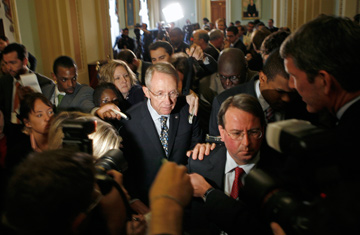Senate Republicans and Democrats joined forces Tuesday to directly challenge President-elect Donald Trump over Russia’s interference in U.S. elections and for ongoing aggression in other parts of the world.
The 10 lawmakers, five from each party, introduced sweeping legislation designed to go beyond the punishments against Russia already levied by the Obama administration and to demonstrate to Trump that forcefully responding to Moscow’s meddling isn’t a partisan issue.
“We should all be alarmed by Russian attacks on our nation,” said Sen. John McCain of Arizona, the Republican chairman of the Senate Armed Services Committee. He chided President Barack Obama for not taking more aggressive steps against Russian cyberattacks that have grown bolder over the years.
“This appearance of weakness has been provocative to our adversaries,” McCain said.
U.S. intelligence officials released a declassified report Friday that said Moscow meddled in the 2016 election to help Trump become president. The report concluded Russian President Vladimir Putin ordered an “influence campaign” to undercut public faith in the U.S. political process and to damage Democrat Hillary Clinton’s candidacy. There was no evidence the operation affected any vote tallies, however.
But Trump, who has said he wants better relations with Moscow, rejected the implication that Russian hacking of Democratic emails tipped the election his way. He also derided U.S. intelligence agencies on Twitter, bringing up past failures, specifically intelligence assessments about the presence of weapons of mass destruction in Iraq in the lead-up to the war there.
Kellyanne Conway, a senior aide to Trump, has suggested Trump may roll back the sanctions against Russia.
Obama in late December ordered sanctions on Russian spy agencies, closed two Russian compounds and expelled 35 diplomats the U.S. said were really spies. The new penalties add to existing U.S. sanctions over Russia’s actions in Ukraine, which have damaged Russia’s economy but had only limited impact on Putin’s behavior.
To help persuade Russia to back off, the new bill would impose mandatory visa bans and freeze the financial assets of anyone who carries out cyberattacks against public or private computer systems and democratic institutions.
The legislation also mandates sanctions in Russia’s all-important energy sector and on investments in the development of civil nuclear projects to rebuke Moscow for its provocations in eastern Ukraine and military support for Syrian President Bashar Assad.
The bipartisan bill also would form a top-level unit within the Treasury Department’s financial crimes offices to target illicit money trails linked to the Russian Federation.
Sen. Ben Cardin of Maryland, the top Democrat on the Foreign Relations Committee and one of the bill’s authors, said he expects members to grill the nominee for secretary of state, Rex Tillerson, at his confirmation hearing Wednesday on whether he believes more and tougher sanctions against Russia are needed.
As CEO of ExxonMobil, Tillerson opposed the sanctions levied on Moscow following its annexation of Ukraine’s Crimean Peninsula in 2014. The penalties cost the energy giant hundreds of millions of dollars.
“I think you’re going to find that there’s going to be a great deal of interest as to whether Mr. Tillerson understands that he is no longer going to be CEO of ExxonMobil but that he’s going to be secretary of state, the nation’s top diplomat,” Cardin told reporters.
In addition to Cardin and McCain, the senators sponsoring the Countering Russian Hostilities Act are Robert Menendez, D-N.J.; Lindsey Graham, R-S.C.; Jeanne Shaheen, D-N.H.; Marco Rubio, R-Fla.; Amy Klobuchar, D-Minn.; Ben Sasse, R-Neb.; Dick Durbin, D-Ill.; and Rob Portman, R-Ohio.
___
Follow Richard Lardner on Twitter: http://twitter.com/rplardner


